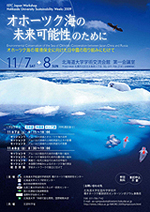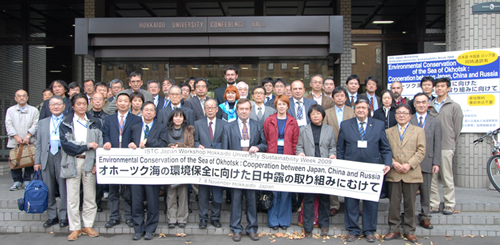ISTC Japan Workshop
Hokkaido University Sustainability Weeks 2009
International Symposium on “Environmental Conservation of the Sea of Okhotsk:
Cooperation between Japan, China and Russia”

Please click to see Poster Image
(Japanese only)
Hosted by...

Pan-Okhotsk Research Center

Slavic Research Center

RIHN
New Energy Resources Research Center

Hokkaido Regional Development Bureau
ISTC

Initiative for Sustainable Development
Date: November 7 (Sat.)-8 (Sun.)
Place: Conference Hall of Hokkaido University, Sapporo JAPAN
Hosted by:
Pan-Okhotsk Research Center, ILTS, Hokkaido University
Slavic Research Center, Hokkaido University
Research Institute for Humanity and Nature(RIHN)
New Energy Resources Research Center, Kitami Institute of Technology
Ministry of Land, Infrastructure and Transport, Hokkaido Regional Development Bureau
The International Science and Technology Center (ISTC)
Initiative for Sustainable Development, Hokkaido University
Co-hosted by:
Ministry of Education, Culture, Sports, Science & Technology Japan
Official symposium languages: Russian, Chinese and Japanese (Simultaneous translations between the languages will be provided)
*Please download the abstract paper by clicking here.
★Joint Declaration is approved in the symposium.
1. English 2. Chinese 3. Russia 4.Japanese

Objectives
The Sea of Okhotsk provides unique environment with respect to physical, geochemical and biological aspects based on its natural peculiarity being the southern boundary of the seasonal sea ice in the northern hemisphere. The biodiversity and the rich marine biological resources are not only of local but also of worldwide importance.
It has been believed that the Amur River plays an important role in the formation of Sea ice in such a low latitude ocean. Recently, both positive and negative impacts of the Amur River on the Sea of Okhotsk became apparent. The positive impact is the contribution of dissolved iron supplied by the Amur River to the primary production in the Sea of Okhotsk and neighboring Oyashio open water, and the negative one is contamination of polluted materials from the Amur River to the Sea of Okhotsk. These impacts suggest that the conservation of the Sea of Okhotsk and its neighboring Oyashio region can be accomplished only by considering the Amur River basin and the Sea of Okhotsk as single ecological system.
The Amur River basin has a vast drainage area of 2,051,500 km2 and it is shared by Mongolia, China and Russia, in which more than 1 hundred million of people live. Rapid changes in land-use occurred in the later half of the 20th century might have affected on the discharge of dissolved iron and other substances. Growing industrial activities in the basin might have polluted the Amur River as clearly exemplified by the explosive accident occurred at a petrochemical plant in Chinese Jilin Province in November 2005. If this situation continues, the Sea of Okhotsk and the neighboring Oyashio region will be seriously impacted by the Amur River in near future.
Rapid expansion of global economy has increased export-import among the North East Asian countries which had been geopolitically less active in the 20th century. Wood trading, for example, became extremely active among Russia, China and Japan since the turn of 20th century, and sea products from the Sea of Okhotsk and the Oyashio region have been intensively consumed in China these days. On the contrary, enormous amount of Chinese agricultural products are being imported to Japan to satisfy its growing consumption of food. Therefore, North East Asian countries depends each other in economic and the necessity of conservation on natural environments on which economy depends becomes an urgent issue in this area.
This symposium provides an occasion for academic researchers to discuss how we can conserve this vast ecological linkage between the continent and the oceans for the future sustainability. Based on the scientific discussions during the symposium, the organizing committee would like to launch an international scientific board, "Amur-Okhotsk Consortium", to further discuss the sustainability of the Amur-Okhotsk system.
The symposium will be open for citizens with the help of simultaneous translation.
Sessions
- Physical backgrounds of the Amur River basin and the Sea of Okhotsk
- Land-use changes in the Amur River basin and their impacts
- Background of land-use changes in the Amur River basin
- Russo-Chinese attempt in conserving the Amur River
- Russo-Japanese attempt in conserving the Sea of Okhotsk
- Possible Chino-Japanese cooperation on the conservation of the Amur River
- Conservation of the Sea of Okhotsk by variable stakeholders
Organizing committee
<Chief>
Prof. Naoto Ebuchi, Pan-Okhotsk Research Center, the Institute of Low Temperature Science, Hokkaido University
<Members>
Prof. Shinichiro Tabata, Slavic Research Center, Hokkaido University
Assoc. Prof. Takayuki Shiraiwa, Research Institute for Humanity and Nature
Prof. Hitoshi Shoji, New Energy Resources Research Center, Kitami Inst. Technology
Mr. Shuji Sannabe, Hokkaido Regional Development Bureau
Mr. Yasuhiro Yukimatsu, The International Science and Technology Center (ISTC)
Ms. Riyuki Takemura, Hokkaido University Initiative for Sustainable Development
Prof. Emeritus Noriyuki Ohtaishi, Hokkaido University
Prof. Hiroyuki Matsuda, Yokohama National University
Prof. Hiroaki Kakizawa, Hokkaido University
Assoc. Prof. Jun Nishioka, Institute of Low Temperature Science, Hokkaido University
Dr. Sumito Matoba, Institute of Low Temperature Science, Hokkaido University
Dr. Takeo Onishi, Research Institute for Humanity and Nature
Mr. Yasunori Hanamatsu, Research Institute for Humanity and Nature
Ms. Tamaki Kawaguchi, Research Institute for Humanity and Nature
-------------------------------------------------------------------------------
Symposium office
Pan-Okhotsk Research Center, the Institute of Low Temperature Science, Hokkaido University, tel: +81-11-706-5485, fax: +81-11-706-7142,
e-mail: ao-symposium@lowtem.hokudai.ac.jp
Program
-green letters denote unconfirmed speakers
-Please click to see the link for each abstract paper
November 7 (Saturday)
09:15-09:30
Opening Adress by Takeo Hondoh, Executive and Vice-President, Hokkaido University
09:30-12:25
Session 1: Physical backgrounds of the Amur River basin and the Sea of Okhotsk
Session Convener: Naoto Ebuchi (ILTS, Hokkaido University)
9:30-9:55
Kay I. Ohshima (ILTS Hokkaido Univ.)
"Impact of the sea ice reduction in the Sea of Okhotsk on the North Pacific".
9:55-10:20
Jun Nishioka (ILTS Hokkaido Univ.) and Takeshi Nakatsuka (Nagoya Univ.)
“Intermeiate layer iron transport supporting the biological production in the Oyashio region”
10:20-10:45
Eugene V. Karasyev (Far Eastern Regional Hydrometeorological Research Institute)
“The Monitoring of the Sea of Okhotsk"
10:45-11:10
Ryuji Fukuyama (Hokkaido Institute of Environmental Sciences)
"Coastal Waters Study in Hokkaido - especially, on the Sea of Okhotsk – "
11:10-11:35
Otsuka Hideyuki, Niwa Shinobu, and Akiyama Masayuki (Hokkaido Institute of Environmental Sciencies)
"Elements in Aerosol at Hokkaido"
11:35-12:00
Takeo Onishi (RIHN)
“Modeling of dissolved iron production and transport of the Amur River basin”
12:00-12:25
Humio Mitsudera (ILTS Hokkaido Univ.)
“Modeling intermediate water and iron transport in the Sea of Okhotsk and the northern North Pacific”
12:25-13:30 Lunch
13:30-16:00
Session 2: Land-use changes in the Amur River basin and their impacts
Session Convener: Da Zhigang (Heilongjiang Provincial Academy of Social Sciences)
13:30-13:55
Sergey Ganzey (PIG/FEBRAS, Russia)
“Historical changes in land-use/LAND COVER in the Amur River basin”
13:55-14:20
Muneoki Yoh (Tokyo Univ. of Agriculture and Technology) and Hideaki Shibata (Hokkaido Univ.)
“Impact of land-use changes in iron transport”
14:20-14:45
Yan Baixin (NEGAE, China)
“Effect of wetland reclaimation on iron species”
14:45-15:10
Lubov Kondratyeva (IWEP/FEBRAS, Russia)
“CHRONIC POLLUTION OF THE AMUR RIVER WITH TOXIC ORGANIC MATTER”
15:10-15:35
Liu Haijin (Chinese Academy of Fishery Sciences, China)
“The investigation and estimation on influences of Songhuajiang River’s nitrobenzene leakage incident to fishery environment”
15:35-16:00
Yuichi Osa, Ruriko Tahara (Hokkaido Institute of Environmental Science)
"Development of environmental assessment for the impact of an oil spill and other accidental pollution on a marine ecosystem"
16:00-16:20 Tea break
16:20-18:00
Session 3: Backgrounds and impacts of land-use changes in the Amur River basin
Session Convener: Shinichiro Tabata (Slavic Research Center, Hokkaido University)
16:20-16:45
Hiroaki Kakizawa (Hokkaido Univ.)
“Trend of forest resources, policy and management in Khabarovsk Krai”
16:45-17:10
Park Hong (Hokkaido Univ.)
“Development of agriculture in Chinese Sanjiang Plain”
17:10-17:35
Feng Anquan (East China Normal University, School of Advanced International and Area Studies)
“Chinese-Russian Wood Trade and Economic Cooperation in This Field”
17:35-18:00
Natalia Mishina (PIG/FEBRAS, Russia)
“Foreign trade relations between Russia, China and Japan as factor of land use/cover changes in the Amur River Basin”
18:30-20:30 Banquet
November 8 (Sunday)
08:30-10:00
Session 4: Russo-Chinese attempt in conserving the Amur River
Session Convener: Peter Baklanov (Pacific Geographical Institute, FEBRAS)
08:30-08:55
Alexey Makhinov (IWEP/FEBRAS, Russia)
“AMUR RIVER MONITORING: MAIN RESULTS AND IMPROVEMENT PROBLEMS”
08:55-09:20
Song Nanzhe (Environmental Monitoring Station, Heilongjiang Province)
"Water environmental equality situation and character analysis along Heilongjiang valley"
09:20-09:45
Eugene Simonov (WWF Russia)
“International treaties in Amur River Basin and development of transboundary environmental policies”
09:45-10:00 Tea break
10:00-12:05
Session 5: Russo-Japanese attempt in conserving the Sea of Okhotsk
Session Conveners: Noriyuki Ohtaishi (Prof. Emeritus, Hokkaido University) and Hiroyuki Matsuda (Yokohama National University)
10:00-10:25
Kirill A. Zharikov(Marine Mammal Laboratory, VNIRO, Russia)
"Marine mammals in the Sea of Okhotsk;abundance, consumption of resources, and outlook for future studies."
10:25-10:50
Orio Yamamura, (Hokkaido National Fisheries Research Institute, FRA), Kaoru Hattori (Hokkaido National Fisheries Research Institute, FRA) and Mari Kobayashi (Tokyo University of Agriculture)
"Okhotsk Sea ecosystem: Fishery production and research activities in Japan-Russia adjoining area"
10:50-11:15
Hidehiro KATO (Tokyo University of Marine Science and Technology),Tomio MIYASHITA (National Research Institute of Far Seas Fisheries) and Yoshihiro FUJISE (The Institute of Cetacean Research)
"Cetacean fauna, abundances and population dynamics in Okhotsk Sea, with some notes on future prospect of their conservations and managements."
11:15-11:40
Hiroyuki MATSUDA (Yokohama National University)
"On the “Japan-Russia Cooperation on the Conservation of Ecosystems”"
11:40-12:05
Hitoshi Shoji (Kitami Institute of Technology), Young Keun Jin, Anatoly Obzhirov and Boris Baranov
"International study efforts on gas hydrates near cold seeps NE off the Sakhalin in the Sea of Okhotsk"
12:05-13:15 Lunch
13:15-14:30
Session 6: Possible Chino-Japanese cooperation on the conservation of the Amur River
Session Convener: Yan Baixin (NEGAE, China)
13:15-13:4014:30-14:45 Tea break
Akiteru Kawamura (Hokkaido Regional Development Bureau)
”Environmental Technologies and Experiences in the field of the environment developed in Hokkaido”
13:40-14:05
Da Zhigang (Heilongjiang Provincial Academy of Social Sciences)
"Sino-Japan Trade · Agricultural Cooperation: Review and Prospects of Cooperation between Heilongjiang Province and Hokkaido"
14:05-14:30
Susumu Yoshida (ERINA)
“The Designation of the Sea of Okhotsk Region and the Cooperative Relationships with Each of the Neighboring Countries”
14:45-16:50
Session 7: Conservation of the Sea of Okhotsk in multilateral relationship
Session Convener: Hiroaki Kakizawa (Hokkaido Univ.)
14:45-15:10
Takayuki Shiraiwa and Yasunori Hanamatsu (RIHN)
“The Giant Fish-Breeding Forest Hypothesis and its conservation”15:10-15:35
Sergey Prokopenko (Sakhalin State University, Russia)
"Changes in Attitudes of Sakhalin Population towards the Purity of the Okhotsk Shore"
15:35-16:00
Masaaki Aota (Okhotsk Sea Ice Museum of Hokkaido)
“Twenty four years of the International Symposium on Okhotsk Sea & Sea Ice"
16:00-16:25
Nikolay Vlasov (HELCOM, Finland)
“HELCOM - 35 years of protecting the Baltic Sea”
16:25-16:50
Peter Baklanov (PIG/FEBRAS, Russia)
“Directions of sustainable development of Russian Far East ”
16:50-18:00
General discussion and conclusion
Chairman: Takayuki Shiraiwa (RIHN)
Comment: Yu Takagi (ISTC)18:00-18:15
"the role of International Science and Technology Center, ISTC"(in Japanese)
Closing Adress by Keigo Yanagiya, Deputy Director, Ministry of Land, Infrastructure and Transport, Hokkaido Regional Development Bureau
